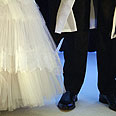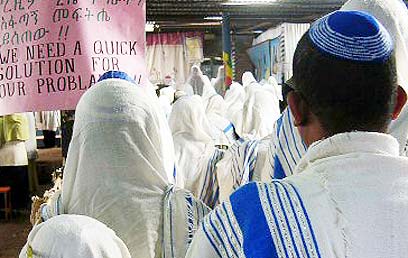
I now pronounce you conned
Ethiopians couples faulted for having 'questionable' Jewish identity just before their wedding find themselves paying small fortune to execute fake weddings on original date
This was going to be S. and A.'s most memorable night. The young Ethiopian couple dreamed of standing under the chuppah in a wedding hall in Ness Ziona; the rabbi gave A. the ring, as he placed it on his soon-to-be wife’s finger. “With this ring, you are consecrated unto me according to the law of Moses and Israel,” he repeated after the rabbi, and broke the glass to the applauding roar of his guests.
There was only one problem: The entire wedding ceremony, including the chuppah, blessings, ring and the breaking of the glass, were all for show, a sham orchestrated by the couple and three rabbis for a few thousand shekels in cash.
The phenomenon, as it turned out, is not unique: Yedioth Ahronoth received testimonies from other Ethiopian couples who encountered a similar experience; shortly before the wedding, and after having made all the arrangements, Rabbi Yosef Hadana, chief rabbi of the Ethiopian community in Israel, informed them there was a problem with the Jewish status of one of them, meaning the wedding could not be officiated on the appointed date.
After causing the couples such severe distress, Rabbi Hadana then referred to acquire a speedy conversion, simultaneously telling them to seek Rabbi Shalom Tsadok, of the local council Bnei Ayish. The latter, they were told, could help “solve the problem.”
Tsadok on his part offered the couple a quick fix: A fake wedding attended by an authentic rabbi, so that at least the guests believe they are witnessing a real Jewish wedding.
He also referrered the couples to a rabbi who officiates such ceremonies – Rabbi Shilo Tsadok, a rabbi from Kiryat Ata, also known as “Rabbi Shaul” or “Rabbi Shauli” – who just happens to be his son. The price tag for a fake weeding? About NIS 4,000 (approx. $1200).
Last minute problems
“Three and a half months before the wedding, I came to Rabbi Hadana who told me everything was in place and that I should return just before the wedding,” said D., one of the grooms “wedded” by Rabbi Tsadok. “When I came back to register three weeks before the wedding, after having booked a hall and everything else, he (Tsadok) told me there was a problem with my and my fiancee's Jewish status.“On one hand, there’s the loss of tens of thousands of shekels in wedding expenses, which you have saved up for years. On the other hand you can’t talk about not being considered Jewish,” says A., who was recently married in such a “scam-wedding.”

Falashmura Ethiopians. (Illustration Photo: AFP)
“You find yourself helpless before people who are 'supposedly' capable of getting you out of this mess; who take your money and humiliate you in a degrading ceremony.”
Having no choice, A. returned to Rabbi Hadana who then referred him to Rabbi Tsadok, who in turn sent him to Rabbi Shilo. “A wedding with a rabbi has a price,” Rabbi Tsadok told him. “In cash, inside an envelope.” The final price paid for the wedding was NIS 3,000 (about $900.)
Both Rabbi Shalom Tsadok and his son are authorized by the Chief Rabbinate of Israel to officiate weddings, but according to standard regulations, neither one is allowed to demand a fee from the family without reporting it. In many cases, the officiating rabbi gets a gratuity from the families, to the tune of about NIS 1,000 (about $300).
Rabbi Hadana told the “problematic” couples that after the sham-wedding and proper conversion are over, he will hold another ceremony in his office for an additional fee. The couples quoted in this article opted not to continue the conversion process, and have yet to be legally married.
_wa.jpg)
A wedding with a rabbi has a price (Illustration photo: Yaron Brener)
'It's for your own good'
A Yedioth Ahronoth reporter approached Rabbi Shalom Tsadok with a “similar case,” in a bid to verify the couples’ complaints.
“Rabbi Shilo is introduced when it's necessary and conducts the wedding; he is popular but must be paid what he asks for,” Rabbi Shalom Tsadok told him, adding he was "not involved with setting the price."
When asked by the reporter whether he could ask Rabbi Hadana about Rabbi Shilo, or tell him that the wedding was not a real one, Rabbi Tsadok said: “You can, but no one should know it was make-believe… Rabbi Hadana probably knows everything…it’s for your own good.”
The Rabbinate, added Rabbi Tsadok, will not recognize the marriage. "It's not binding. It's just a little ceremony."
The reporter than asked the rabbi whether NIS 3,000 ($900) would be enough. “He will only want cash,” said Rabbi Tsadok. "When you get to the wedding hall, you meet him before you go in, give it to him personally and then enter the hall with him.”
The wedding, explained the rabbi, is invalid: "It doesn’t count, just a make-believe… It’s artistry. There will be a wedding and everything, a ring too.”
'We are doing Ethiopians a favor'
According to the Halacha, one of the problems lies in the blessings recited by the rabbi during the ceremony. The Rabbi makes sure not to read them in full so as not to bless in vain. The wedding has no official meaning as the couple doesn’t register with the Interior Ministry or the Chief Rabbinate and is not entitled to any married couples’ benefits.
However, a halachic problem may arise in the future; as Rabbi Shaul may take the ketubah, the Jewish marriage contract, with him; but only after the couple had already taken pictures holding it. It is likely that if their non-Jewish children try to register for marriage years from now, and present evidence that their parents wedding was officiated by an Orthodox rabbi – they will be recognized as Jews, even though they are not.
Rabbi Shilo initially tried to avoid Yedioth Ahronoth's repeated appeals for a formal response but eventually consented: “I do not marry non-Jews,” he said. As for A’s case, Tsadok denied marrying him: “I didn’t marry him, I only did him a favor because he asked me to.”
Rabbi Shalom Tsadok said that "we are doing the Ethiopian community a favor and I intend to stop it. Rabbi Hadana has been asking me to help people whose Jewishness is in question so I do it.”
Rabbi Hadana told Yedioth Ahronoth that “every man who does such a thing walks around with a broken heart. Sometimes you have to go against your own conscience and listen to the family’s wishes.”
The Chief Rabbinate said that following the information presented by Yedioth Ahronoth it will summon Rabbi Shilo Tsadok to a hearing before the wedding officiators' committee, and is considering revoking their officiators' permits.
According to the Chief Rabbinate, Chief Sephardic Rabbi of Israel Shlomo Amar, who was made aware of the issue, intends on handling the matter personally, and "if need be the rabbis will be disciplined to the full extant of the law."
MK Shlomo Mula (Kadima) urged Attorney General Menachem Mazuz Wednesday, to launch an immediate investigation into the three rabbis' dealings.
The Ethiopian community was reportedly enraged by the affair. Following the publication, Rabbi Yosef Hadana have a radio interview and said he regrets the turnout of events, stressing he never meant to cause anyone any distress.
"I've been pressured into these actions, but now that things have been made public, I will cease doing it. From now on, anyone who encounters this problem can try to figure it out for themselves."
Danny Adino Ababa contributed to the report










